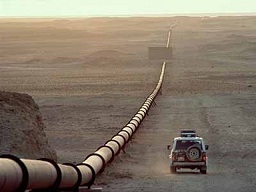 Iraq has shortlisted 12 international companies and consortiums to build the country's first oil export pipeline in decades, and will ask them to submit their bids by the end of this year for an $18 billion project that will make the country less dependent on Persian Gulf export terminals, two oil industry sources said Wednesday.
Iraq has shortlisted 12 international companies and consortiums to build the country's first oil export pipeline in decades, and will ask them to submit their bids by the end of this year for an $18 billion project that will make the country less dependent on Persian Gulf export terminals, two oil industry sources said Wednesday.
Iraq's oil ministry has chosen these companies out of more than 80 international companies which submitted their credentials to build a section of the 1, 680-kilometer pipeline stretching from the oil hub of Basra in southern Iraq to Jordanian port of Aqaba in the Red Sea, sources said.
The short-listed companies and consortiums are: Lukoil OAO Holdings, China National Petroleum Corporation, Marubeni Corporation, Mitsui & Co. Ltd., Toyota Tsusho, Punj Lloyd (India) and Mass Global International (Iraq), Saipem, Daewoo International Corporation, Consolidated Contractors Company, or CCC (Greece), Go Gas, L&T and Fuis Capital Ltd., Petrofac and Stroygazconsulting, or SGC, and Orascom and Petrojet (Egypt).
SCOP will invite the short-listed companies to receive the tender package, the second person said. SCOP will also propose that companies need to submit their offers by November or December, sources added.
Iraq and Jordan signed a preliminary agreement in April to build the section of the pipeline that would stretch from an Iraqi oil pumping station in Haditha, west of Iraq, to Aqaba. The rest of the pipeline, which is 680 kilometers long, linking a Basra pumping station with the one in Haditha would be built and financed by the Iraqi oil ministry.
Iraq hopes the pipeline will make it less dependent on Persian Gulf export terminals, providing the country with an alternative route if Iran closes the Strait of Hormus. Tehran has threatened on several occasions to close the strategic waterway through which 35% of the world's shipborne oil is exported, most recently in response to international sanctions over its suspect nuclear program.
Last year Iraq started design and feasibility studies on the pipeline that's expected to carry 2.25 million barrels a day. The country is now preparing to start work on the section from Haditha to Aqaba, with a capacity of 1 million barrels a day. A third section of the pipeline, running to Syria's Banias port in the Mediterranean, has been postponed because of the conflict in the neighboring country. It would have a capacity of 1.25 million barrels a day.
Under the agreement signed in April, Iraq would supply energy-poor Jordan with 150,000 barrels a day to feed its Zarqa refinery near Amman. Iraq will also supply Jordan with 100 million cubic feet a day of gas via another pipeline that will be built parallel to the oil line.
Kobieta